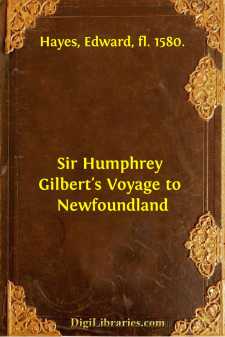Categories
- Antiques & Collectibles 13
- Architecture 36
- Art 48
- Bibles 22
- Biography & Autobiography 813
- Body, Mind & Spirit 142
- Business & Economics 28
- Children's Books 17
- Children's Fiction 14
- Computers 4
- Cooking 94
- Crafts & Hobbies 4
- Drama 346
- Education 46
- Family & Relationships 57
- Fiction 11829
- Games 19
- Gardening 17
- Health & Fitness 34
- History 1377
- House & Home 1
- Humor 147
- Juvenile Fiction 1873
- Juvenile Nonfiction 202
- Language Arts & Disciplines 88
- Law 16
- Literary Collections 686
- Literary Criticism 179
- Mathematics 13
- Medical 41
- Music 40
- Nature 179
- Non-Classifiable 1768
- Performing Arts 7
- Periodicals 1453
- Philosophy 64
- Photography 2
- Poetry 896
- Political Science 203
- Psychology 42
- Reference 154
- Religion 513
- Science 126
- Self-Help 84
- Social Science 81
- Sports & Recreation 34
- Study Aids 3
- Technology & Engineering 59
- Transportation 23
- Travel 463
- True Crime 29
Sir Humphrey Gilbert's Voyage to Newfoundland
by: Edward Hayes
Description:
Excerpt
INTRODUCTORY NOTE
Sir Humphrey Gilbert, the founder of the first English colony in North America, was born about 1539, the son of a Devonshire gentleman, whose widow afterward married the father of Sir Walter Raleigh. He was educated at Eton and Oxford, served under Sir Philip Sidney's father in Ireland, and fought for the Netherlands against Spain. After his return he composed a pamphlet urging the search for a northwest passage to Cathay, which led to Frobisher's license for his explorations to that end.
In 1578 Gilbert obtained from Queen Elizabeth the charter he had long sought, to plant a colony in North America. His first attempt failed, and cost him his whole fortune; but, after further service in Ireland, he sailed again in 1583 for Newfoundland. In the August of that year he took possession of the harbor of St. John and founded his colony, but on the return voyage he went down with his ship in a storm south of the Azores.
The following narrative is an account of this last voyage of Gilbert's, told by Edward Hayes, commander of "The Golden Hind," the only one to reach England of the three ships which set out from Newfoundland with Gilbert.
The settlement at St. John was viewed by its promoter as merely the beginning of a scheme for ousting Spain from America in favor of England. The plan did not progress as he hoped; but after long delays, and under far other impulses than Gilbert ever thought of, much of his dream was realized.
A report of the Voyage and success thereof, attempted in the year of our Lord 1583, by Sir Humphrey Gilbert, Knight, with other gentlemen assisting him in that action, intended to discover and to plant Christian inhabitants in place convenient, upon those large and ample countries extended northward from the Cape of Florida, lying under very temperate climes, esteemed fertile and rich in minerals, yet not in the actual possession of any Christian prince. Written by Mr. Edward Hayes, gentleman, and principal actor in the same voyage,[*] who alone continued unto the end, and, by God's special assistance, returned home with his retinue safe and entire.
[*] Hayes was captain and owner of theGolden Hind,
Gilbert's Rear-Admiral.
Many voyages have been pretended, yet hitherto never any thoroughly accomplished by our nation, of exact discovery into the bowels of those main, ample, and vast countries extended infinitely into the north from thirty degrees, or rather from twenty-five degrees, of septentrional latitude, neither hath a right way been taken of planting a Christian habitation and regiment (government) upon the same, as well may appear both by the little we yet do actually possess therein, and by our ignorance of the riches and secrets within those lands, which unto this day we know chiefly by the travel and report of other nations, and most of the French, who albeit they cannot challenge such right and interest unto the said countries as we, neither these many years have had opportunity nor means so great to discover and to plant, being vexed with the calamities of intestine wars, as we have had by the inestimable benefit of our long and happy peace, yet have they both ways performed more, and had long since attained a sure possession and settled government of many provinces in those northerly parts of America, if their many attempts into those foreign and remote lands had not been impeached by their garboils at home....


